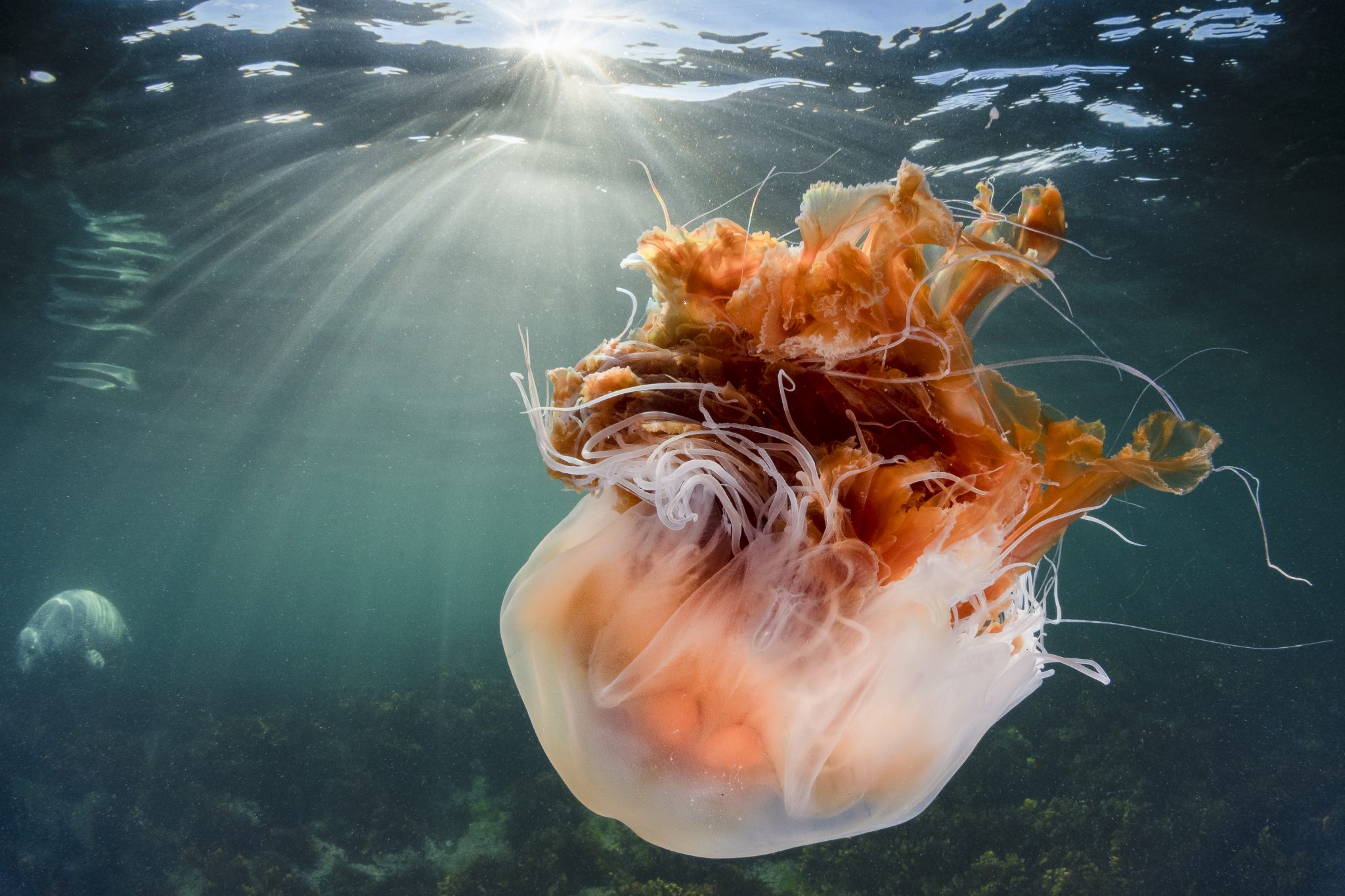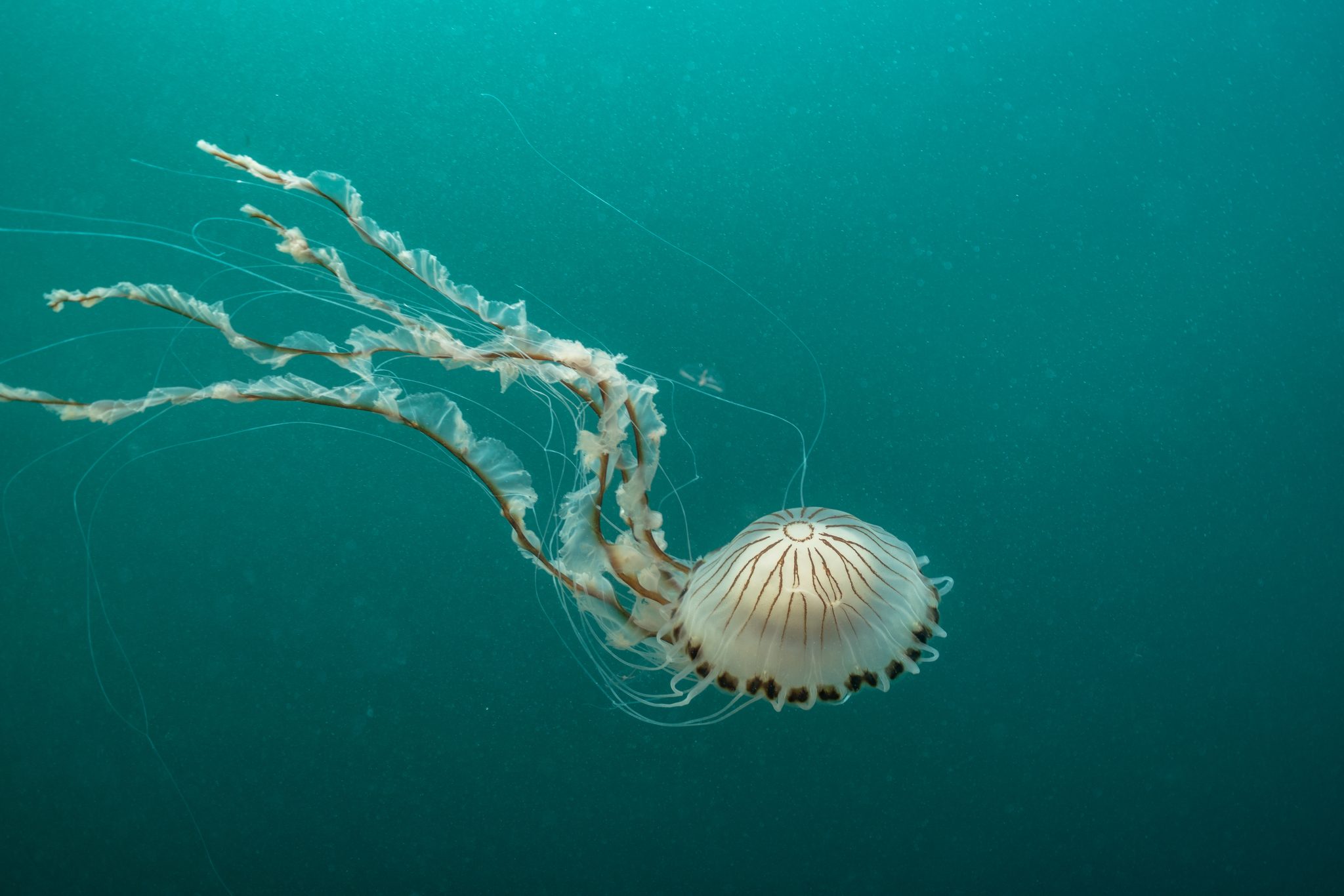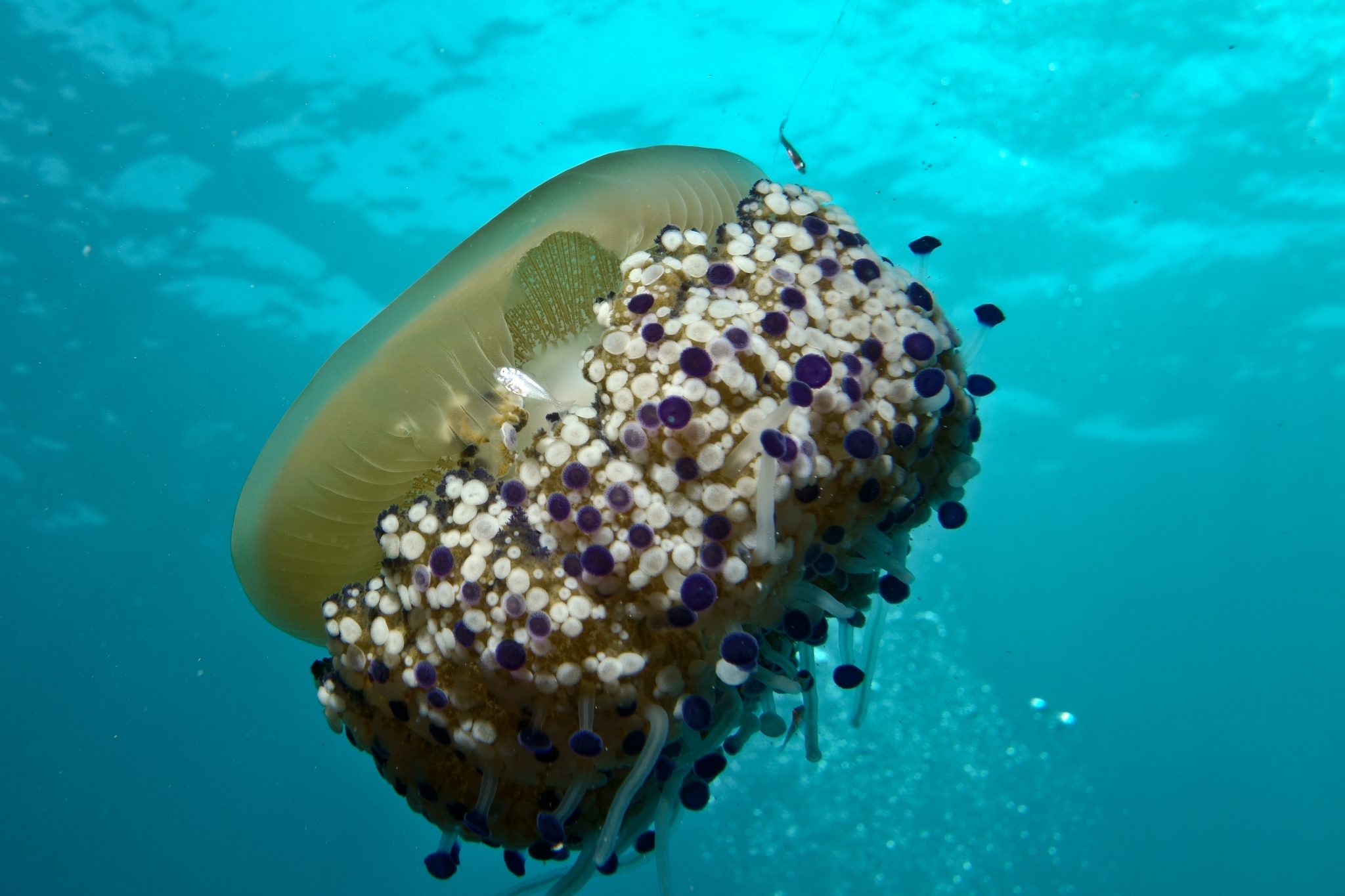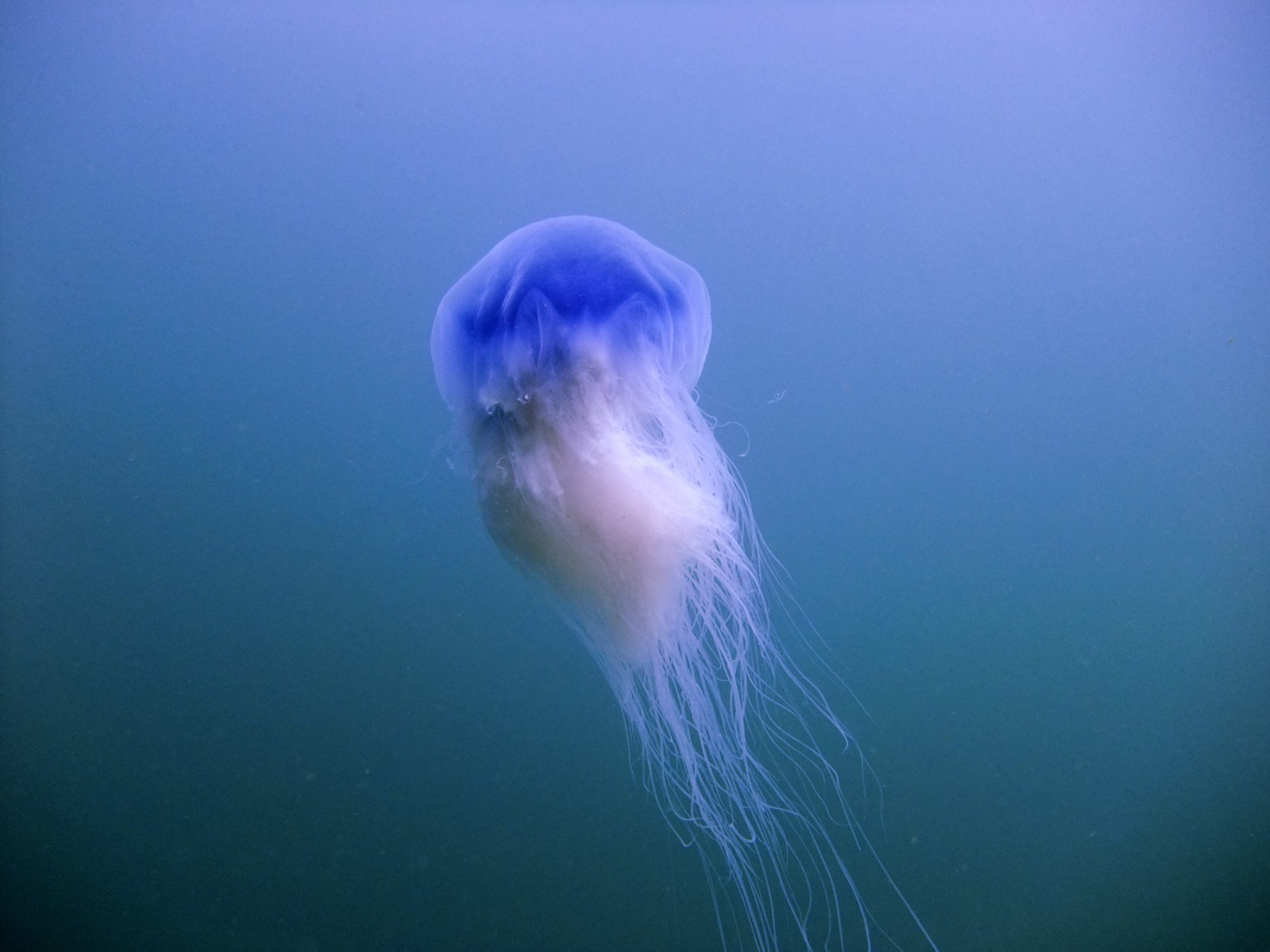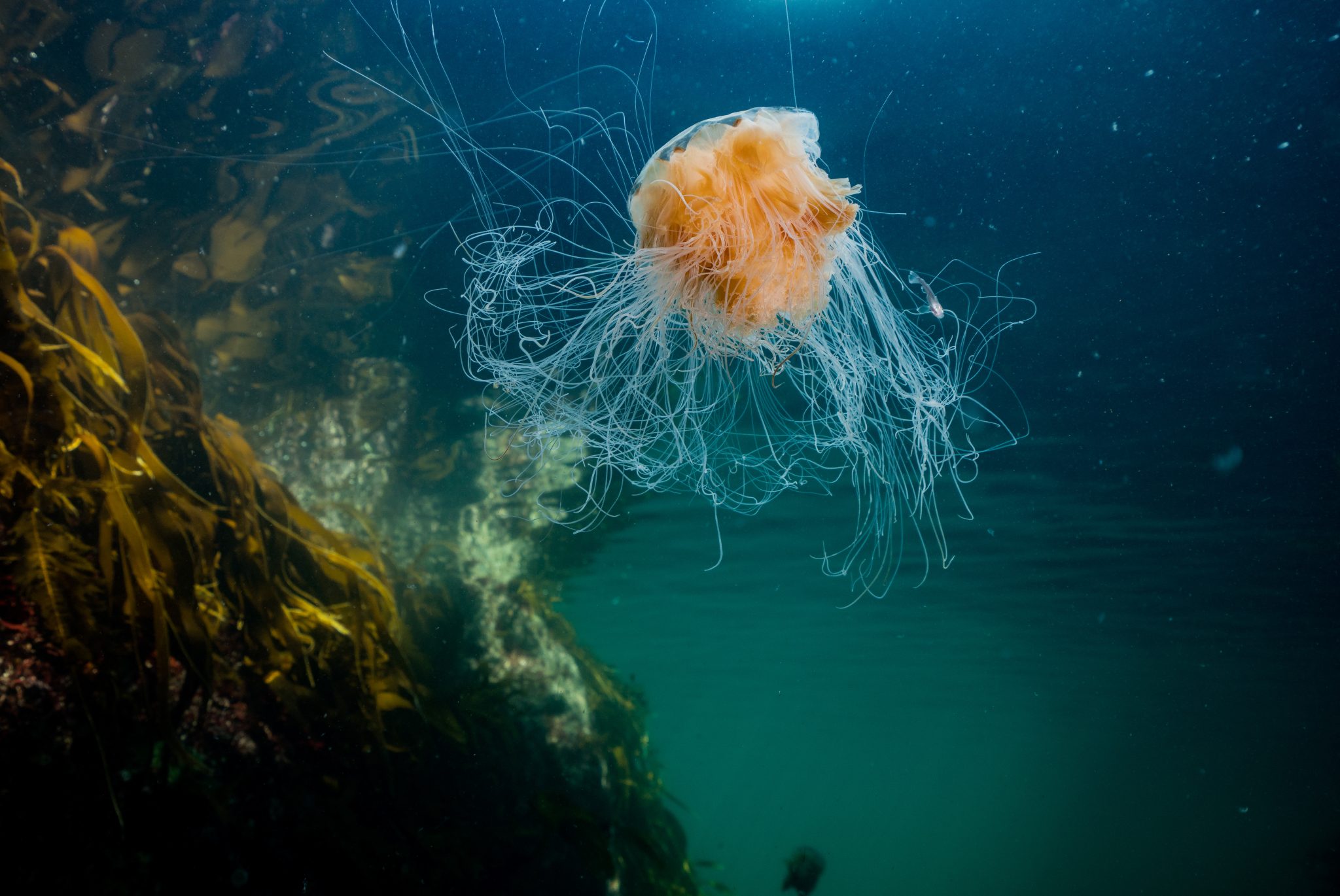Marine Life & Conservation
Marine Conservation Society’s report shows increase in jellyfish sightings on UK and Irish shores
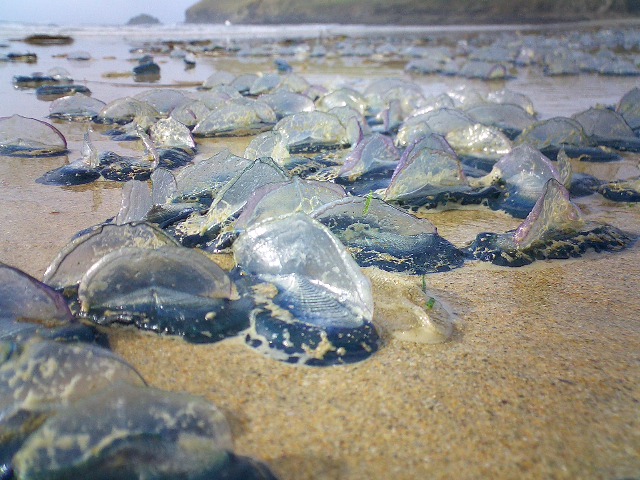
The Marine Conservation Society has released its annual Wildlife Sightings report, marking World Jellyfish Day on Friday 3rd November.
The charity’s wildlife sightings project focusses on gathering reports of jellyfish and marine turtles, which feed on jellyfish. These two marine animals are both vital in supporting ocean biodiversity and are indicators of changes in our ocean over time, like warming waters. The charity’s report provides a detailed breakdown of the species observed, revealing the diversity of jellyfish in UK and Irish waters.
This year’s report (covering 1st October 2022 to 30th September 2023) shows a 32% increase in jellyfish sightings compared to the previous year.
Jellyfish can be spotted year-round in UK and Irish seas, but larger blooms are more likely to appear in spring, lasting through until autumn. The Marine Conservation Society’s report shows 75% of sightings were of individuals (1-20), whilst 11% of sightings were of large blooms of over 100 individuals, an increase of 57% from last year.
Research has suggested that an increase in some jellyfish numbers around UK could be related to climate change, however, currently there isn’t enough evidence to make this link. The Marine Conservation Society’s Wildlife Sightings programme aims to collect long term data which can be used as a reference to study the reality of jellyfish trends in UK waters.
Dr Peter Richardson, Head of Ocean Recovery at the Marine Conservation Society, said, “Jellyfish populations are highly variable year on year, and depend on several environmental factors that are different each year, such as sea temperatures and storms. Numbers of sightings we receive can also depend on the awareness of our sightings programme and the ‘wow factor’ of jellyfish people encounter.
“This year seems to have been a particularly good year for barrel jellyfish – one of our chunkiest jellyfish species that can occur in mind-boggling numbers when conditions are favourable. It’s only by observing trends over many years that we can start to suggest reasons for change.”
The most frequently reported species during the reporting period was the barrel jellyfish, which accounted for almost 27% of total sightings (467). This is an increase of 21% compared to the previous year’s results, when it was the sixth most-spotted species. Barrel jellyfish are sometimes called ‘dustbin lid jellyfish’ due to their large size – they can grow up to one metre in diameter. They have a solid, spherical, rubbery-looking bell which can be white, pale pink, blue or yellow. Rather than tentacles, barrel jellyfish have eight thick, frilled arms.
The report features other intriguing jellyfish-like species, including crystal and comb jellies, and sea gooseberries, which made up 10% of the total sightings this year. Crystal jellyfish were the most reported ‘other’ species, accounting for 3.2% of all sightings.
The Marine Conservation Society also records reports of marine turtles, which feed on jellyfish. The charity’s volunteers submitted 12 reports of marine turtle sightings this year, four of which were live leatherbacks. Turtle sightings contribute to a national database.
Six of the world’s seven marine turtle species have been spotted in UK and Irish seas. The leatherback turtle is most likely to be spotted feeding on our jellyfish during the summer months., while stray juvenile loggerheads are usually encountered washed up in winter. The leatherback, which is the largest sea turtle, and loggerheads are considered to be of ‘vulnerable’ conservation status. Reporting sightings of these incredible creatures will support the Marine Conservation Society and others in understanding their movements, potential threats and how better to protect them through policies and conservation strategies.
Other turtle species are swept into UK and Irish seas by strong winds and currents, though more suited to warmer waters. The charity’s Turtle Code provides advice on what to do if a beached turtle is found.
Justine Millard, Head of Volunteering and Citizen Science at the Marine Conservation Society, said, “The data on jellyfish and turtles that volunteers submit plays a vital role in understanding the changes occurring in our marine ecosystems, and help us to protect our seas. We urge anyone who has spotted a jellyfish or turtle to report it to us to continue to build a picture of our seas and the incredible life within them. A huge thanks to all the volunteers who have submitted data to us this past year.”
The Marine Conservation Society uses wildlife sightings by citizen scientists to:
- Discover how jellyfish and turtle populations are changing around the UK – specifically when and where they are occurring each year
- Investigate trends in turtle sightings to find out more about how they use our waters
- Explore whether jellyfish distribution can tell us more about where leatherback turtle feeding grounds may be
For more information on how to identify jellyfish and turtles, and to report a sighting, please visit the Marine Conservation Society’s website: www.mcsuk.org/sightings.
Marine Life & Conservation
Paul Watson Released as Denmark Blocks Japan’s Extradition Bid

Renowned anti-whaling activist Paul Watson has been released from custody in Greenland after spending five months in detention. Denmark’s Justice Ministry rejected Japan’s request for his extradition, citing insufficient guarantees that his time already served in custody would be credited against any potential sentence.
The 74-year-old Canadian-American was arrested on July 21 in Nuuk, Greenland’s capital, when his ship docked to refuel. His arrest was based on a 2012 Japanese warrant related to a 2010 encounter in Antarctic waters. Japan alleged Watson obstructed operations and caused damage to a whaling research ship during efforts to disrupt illegal whaling. Watson has consistently denied these claims, maintaining his commitment to marine conservation.
Denmark, which oversees extradition matters for Greenland, concluded that while the legal conditions for extradition were met, the lack of assurances from Japan regarding time-served credit made extradition untenable.
In a video shared by his foundation, Watson expressed gratitude and relief, saying, “After five months, it’s good to be out… and good to know they’re not sending me to Japan.” He added that the most difficult part of his time in custody was being separated from his two young sons.
Watson is a pioneering figure in marine conservation, known for founding the Captain Paul Watson Foundation in 2022 after decades of activism with the Sea Shepherd Conservation Society. His bold efforts to defend marine life have earned him widespread support, including from celebrities and conservationists. His work has also been featured in the acclaimed reality TV series Whale Wars.
Watson’s lawyer, Jonas Christoffersen, praised the decision, stating, “We are happy and relieved that Paul Watson is now free.” He added that Watson is eager to reunite with his family and continue his vital work.
The arrest occurred while Watson’s vessel, the M/Y John Paul DeJoria, was en route to the North Pacific with a team of 26 volunteers to intercept a Japanese whaling ship. His foundation described the arrest as politically motivated and emphasized that Watson’s actions were focused on ending illegal whaling practices.
Japan resumed commercial whaling in 2019 after leaving the International Whaling Commission, asserting that whale meat is a cultural tradition. Conservationists, however, continue to challenge these practices, highlighting their impact on marine ecosystems.
Despite the challenges, Watson remains steadfast in his mission to protect marine life and bring attention to whaling practices. His dedication to ocean conservation has made him a globally respected advocate for the environment.
Marine Life & Conservation
12 Days of Zero-Waste Fish-mas

This holiday period, the Marine Conservation Society, the UK’s leading ocean membership charity, invites you to make some simple changes to eating fish this Christmas to help our seas.
Dr Kenneth Bodles, Head of Fisheries and Aquaculture at the Marine Conservation Society, said, “During the festive season, our consumption increases, but so does waste. Sustainability isn’t just about where food comes from – it’s also about how you use it. By reducing waste and making the most out of your seafood, you’re not only taking steps to be more ocean-friendly, but can also help to cut costs during what is often one of the most expensive times of the year”.
The Marine Conservation Society has compiled twelve tips on how to consume seafood sustainably with zero-waste this Christmas:
Buy whole fish instead of fillets
Instead of fillets, consider buying whole fish such as salmon, hake, or lemon sole. By adopting a “nose to tail” approach with cooking, whole-baked fish not only feeds a crowd, but also helps to minimise waste and maximise sustainability by using up every part of the animal, including bones, skin, and fat.
Make fish stock
Leftover fish bones or shells can be put to good use by boiling them to make a nourishing fish stock or bisque. This can be frozen and preserved for later use and makes for a flavourful base in a soup.
Make your own fish pâté
Avoid waste by turning leftover fish, such as smoked mackerel or salmon, into a delicious pâté by blending with cream cheese and lemon. Perfect when paired with crackers.
The sustainability of salmon and mackerel varies depending on where and how it is caught or farmed. For more information on green-rated options, check the charity’s Good Fish Guide.
Buy frozen
By purchasing seafood that is frozen or vacuum-packed, this helps to reduce waste by extending the shelf life of your food.
Fish pie
If you’re wondering what to do with leftover cooked fish, why not opt for a classic fish pie with mashed potatoes, leeks, and a cheesy sauce? A sure crowd pleaser on Boxing Day.
Use the head
Don’t forget the fish head! The meat is incredibly tender and flavourful. The charity recommends a cod’s head curry or recreating Fallow’s renowned cod’s head in siracha butter.
By stretching your ingredients further, not only is this a more sustainable way to enjoy seafood, but also cost-effective by repurposing leftovers and cooking creatively.
Boxing Day brunch
Mix leftover kippers or smoked salmon with scrambled eggs for a tasty, zero-waste, Boxing Day brunch.
For best choice, make sure you buy kippers, or herring, from the North Sea and the North Irish Sea.
Zero-waste storage
A top tip from the Marine Conservation Society to avoid waste is freezing fish offcuts to save for future use.
Crisp up the skin
Even leftover fish skin can be turned into a quick savoury snack by crisping it up in an air fryer with a little olive oil and salt.
Anchovies two ways
Leftover anchovies can either be blended with butter to make a delicious anchovy butter or tossed into pasta for a hit of umami flavour.
The charity recommends opting for anchovies caught in the Bay of Biscay for best choice.
Fishcakes
For an easy, zero-waste meal, leftover seafood trimmings can be mixed with mash and fried in breadcrumbs to make fishcakes.
Pickled mussels
Try pickling mussels in 1:1 vinegar and water, with a dash of sugar for a sustainable, zero-waste snack that can be enjoyed well beyond the festive season.
Mussels farmed in the UK are a seafood superhero. Grown using low-impact methods and harvested by hand, they get all the food they need from the sea around them. This makes them one of the most sustainable, ocean-friendly, and cost-effective seafood options.
Players of People’s Postcode Lottery have raised £6.6M towards the Marine Conservation Society’s vital work in making seafood more sustainable.
Laura Chow, Head of Charities at People’s Postcode Lottery, said: “Fish is a festive favourite for many, but making sustainable choices when it comes to how we buy and eat seafood makes all the difference for our ocean. Support from players of People’s Postcode Lottery has helped the Marine Conservation Society further its sustainable seafood work, so that we can all enjoy healthier, better protected seas.”
The Marine Conservation Society encourages you to make sustainable seafood choices a year-round habit, not just for Christmas. To check how sustainable the seafood on your plate is, you can visit the charity’s Good Fish Guide. The Guide helps consumers and businesses identify the most sustainable seafood using a simple traffic light system, based on where and how species are caught or farmed. Green is the best choice, amber means improvements are needed, and red indicates fish to avoid buying.
Zero-waste gift idea
Why not embrace a zero-waste Christmas by gifting a membership to support marine conservation? It’s a meaningful, low-waste gift that helps protect our ocean for generations to come. Memberships start from as little as £5 a month – the price of a sandwich and drink from your local coffee shop.
Find the latest sustainable seafood advice for wild-caught and farmed seafood on the Good Fish Guide, downloadable to your phone from www.mcsuk.org/goodfishguide.
-

 News2 months ago
News2 months agoIconic SS United States to become the World’s Largest Artificial Reef
-

 News3 months ago
News3 months agoBook Review – 52 Assignments: Underwater Photography
-

 Gear News3 months ago
Gear News3 months agoDYNAMICNORD – New German diving brand enters the British market
-

 News3 months ago
News3 months agoExploring Cenote El Pit: A Diver’s Dream
-

 Gear News3 months ago
Gear News3 months agoTry BARE drysuits (and maybe even win one!) this Friday with Sea & Sea at North West Dive Fest
-

 Marine Life & Conservation3 months ago
Marine Life & Conservation3 months agoBook Review: Coral Triangle Cameos
-

 Blogs2 months ago
Blogs2 months agoDive the Egyptian Red Sea this Autumn with Regaldive
-

 News3 months ago
News3 months ago2024 Ocean Art Underwater Photo Competition Announced


